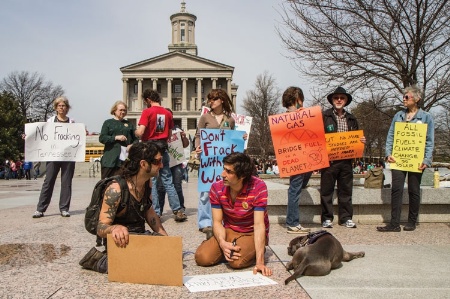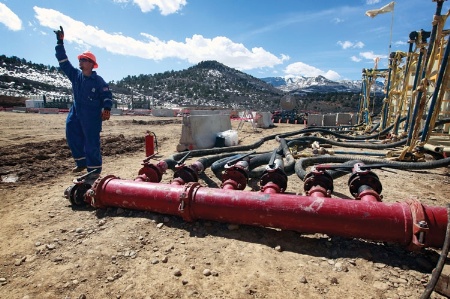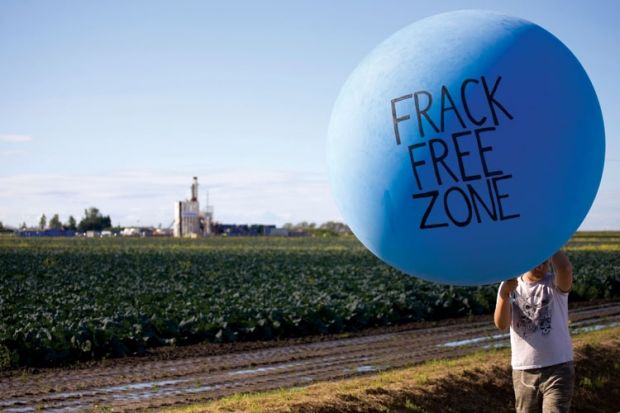Should researchers confronting negative drilling consequences on or near their own campus tell the university to abandon its lucrative new funding stream?
In the spring of this year, The New York Times reported that the University of Tennessee had won state approval to open bidding to award horizontal hydraulic fracturing (fracking) rights to the Cumberland Forest. Once heavily damaged by strip mining, the 8,000 acres of mountainous land controlled by the university had gradually been restored. Now the risk of toxic chemical spills would put its ecological diversity at risk again.
“Frackademia” has become the preferred term to describe the new partnerships forming between academia and the fracking industry.
Leasing land for conventional oil exploration has long been common in Texas and elsewhere, but the footprint for an established oil well is rather modest – about the size of a compact car – and the risks of an oil spill from a given traditional oil installation are minimal.
Not so for fracking. The infrastructure required for a fracking operation is substantial – it includes huge processing stations that push the gas into national pipelines. Toxic spills and air pollution are relatively common.
A report on the environmental risks of fracking (“Environmental impacts during Marcellus shale gas drilling: Causes, impacts, and remedies”) was issued on 15 May 2012 by the State University of New York at Buffalo’s now defunct Shale Resources and Society Institute. Some of the researchers who wrote it had long histories of fracking advocacy and fracking industry funding, and the report raised the bar considerably for what would count as a “serious” spill of toxic chemicals, up from 100 barrels in a 2011 report to 400 barrels in 2012. But even in the Shale Institute’s report, the statistics showed an increase in the number of serious environmental violations between 2008 and 2011: not what you would want threatening your college dormitory.
As a National Geographic article detailed in March (“The new oil landscape: The fracking frenzy in North Dakota has boosted the US fuel supply – but at what cost?”), fracking also requires the bringing in of a substantial workforce that often disrupts the local economy, along with large-scale trucking operations that create clouds of dust and long-term noise pollution. And some of the chemicals pumped into the ground to break up deep shale deposits and release the natural gas – including naphthalene, benzyl chloride, toluene and formaldehyde – are proven carcinogens. Other dangerous components include lead and hydrogen fluoride.
Many would argue, therefore, that there is a conflict of interest between Tennessee’s profit motive and its duty of responsible stewardship of the historic forest. But the full menu of conflicts in force when universities become fracking partners is greater still. Frackademia constitutes a new institutional identity formed by a mixture of political and financial pressures, an identity that can compromise both the environment and academic research.
Tennessee counters that a portion of the royalties it receives from fracking will fund faculty research on the costs, benefits and safety of the extraction process. But that puts university researchers in an uncomfortable and compromising position: if the research confirms that the dangers are real, they must decide whether to warn their own colleagues and administrators about the downsides of this controversial drilling technique. In other words, should researchers confronting negative drilling consequences on or near their own campus tell the university to abandon its lucrative new funding stream? For researchers, that pressure creates a distinctive new conflict of interest.
This is not to imply that the traditional conflicts entailed in industry-funded research are insignificant or irrelevant. Despite the fact that industry contracts are always time limited and often subject to renewal, academics engaged in industry-funded research still establish institutes, rent space, hire research assistants and receive salary supplements and other financial benefits. Thus, there is considerable pressure to satisfy their bankers and renew these grants.
As the American Association of University Professors states in Recommended Principles to Guide Academy-Industry Relationships, a book to be released by the University of Illinois Press early in 2014, industry-funded research is far more likely to reach pro-industry conclusions than research that is peer reviewed and independently funded.
The bias built into the impulse to satisfy one’s industry masters is often unconscious or carefully rationalised. But if a faculty member even appears to have been financially influenced to reach a particular conclusion, the resulting opinion is essentially worthless. For research aimed at establishing a material truth, such results amount to propaganda, not science.

But the real issue is transparency: about funding sources, about the nature of the research an academic has undertaken, about the alliances he or she may have established
There is no more telling example of the compromising intersection of research and funding conflicts of interest than that illustrated by academy-industry fracking reports. In a perfect storm of bad publicity, three fundamentally compromised university fracking studies broke into the national news in 2012. All came from prestigious US research universities. Worse still, all involved a failure to fully disclose the industry funding that either financed the report or had earlier funded its authors.
The AAUP’s Recommended Principles argues that full disclosure of past and present funding sources is the linchpin of efforts to manage conflicts of interest. At the very least, full disclosure alerts both the academic community and the public to the possibility that a faculty member’s judgement may have been compromised. It doesn’t prove wrongdoing. But it provides reasons for scepticism about research conclusions. Where fracking is concerned, research conclusions can have a powerful effect on public policy, the environment and the health of people and animals. The impact of fracking research is not confined to the ivory tower.
As with many other issues, it was public protest that brought press attention to the problematic relationship between fracking and the academy. Indeed, the specific issue of faculty and administrator conflicts of interest over fracking studies and fracking drilling contracts is inevitably entangled with broader concern over fracking’s environmental impact. Neither press coverage nor public criticism of faculty fracking conflicts of interest would have escalated without environmental activism. For the public, faculty conflicts of interest are inseparable from their advocacy for an increasingly controversial industry. That presents a problem for campuses negotiating this terrain, since faculty advocacy needs to be protected. But advocacy for faux science undermines the whole research enterprise.
University researchers who reach fact-based conclusions about the true risks or benefits of fracking have a right to enter the social arena and make their views known. Indeed, it is a core responsibility of academics to provide informed advice about policy matters. Yet public advice can range from scholarly publication to public speaking to legislative testimony to writing opinion pieces for newspapers, to allying with advocacy groups, whether pro- or anti-fracking. Some academics will use all these opportunities; others will be uncomfortable doing so. But, in the US, academic freedom protects academics from institutional reprisals for all these activities. Academic freedom covers both speech internal to the academy and speech outside it.
For some members of the public, advocacy seems inherently to compromise faculty objectivity. But the real issue is transparency: transparency about funding sources; transparency about the nature of the research an academic has undertaken; transparency about the alliances he or she may have established. It was the lack of transparency on all these fronts that got Buffalo’s Shale Institute in trouble and then drew attention to three other fracking studies. One of the lessons of these stories is that greater transparency might help to stop administrators making fools of themselves.
Ten days after the Shale Institute issued its May 2012 report, the Buffalo-based Public Accountability Initiative, a non-profit research and educational organisation, published an 18-page analysis and critique of the report’s findings (“The UB shale play: Distorting the facts about fracking”) and detailed its authors’ history of energy industry ties. This generated coverage from the Associated Press, The New York Times and other media outlets, along with investigative journalism from Buffalo reporters.
Soon after, a group of academics, students and alumni at the State University of New York at Buffalo, along with some New York State citizens, formed the UB Coalition for Leading Ethically in Academic Research (UB CLEAR) and, in June 2012, it began to issue press releases and hold press conferences demanding that the Shale Resources and Society Institute be closed.
UB CLEAR was blunt, declaring that Buffalo’s Shale Institute was “fatally compromised”, that it embodied “not the independent search for knowledge proper to a university but a frantic and servile willingness to sell academic legitimacy to a public relations campaign for the gas industry”.
When the Shale Institute issued its report, the university administration said that it was written without industry funding, but the gas industry had largely funded the 2011 pro-industry lecture series that preceded the formation of the institute. In addition, 43 per cent of the institute’s funding was awarded by the UB Foundation, which is protected by law from having to reveal its donors. And given that the report was issued only weeks after the institute was founded in April, there were legitimate questions about the extent to which it was based on new research.
Three of the report’s four authors had written a pro-fracking report released by the conservative Manhattan Institute for Policy Research a year earlier, and some passages from that report were borrowed (without citation) for the Shale Institute document. The Manhattan Institute is reportedly funded by ExxonMobil and other companies. Indeed, two of the authors of the Shale Institute report, Timothy Considine and Robert Watson, had written (along with two others) a report in 2009 that was funded by the Marcellus Shale Committee, a natural gas industry group. That report (“An emerging giant: Prospects and economic impacts of developing the Marcellus shale natural gas play”) was issued by Pennsylvania State University, which later retracted the initial version and released an update because the first version of the report did not reveal its funding source. When the study started, Considine (now at the University of Wyoming) was teaching at Penn State, where Watson is an emeritus professor. The co-directors of the Shale Institute, John Martin and Robert Jacobi, had strong industry ties and a history of industry funding and consulting.
The Penn State report had helped to convince Pennsylvania legislators to waive taxes for the fracking industry, arguing that the waiver was necessary if Pennsylvania was to win fracking contracts with all the associated local economic benefits. And the Shale Institute report argued that the rate of environmental violations associated with fracking in Pennsylvania had decreased from 2008 to 2011, but the Public Accountability Initiative’s analysis of the Shale Institute’s own data contradicted that claim.

Fracking’s potential risk to deep aquifers remains uncertain, but the consequences of aquifer contamination could be catastrophic
The highly public debate about the Buffalo institute helped to draw national attention to the 2009 Penn State study, and it also set the stage for much wider publicity about a February 2012 report from the Energy Institute at the University of Texas at Austin. The Texas report, “Fact-based regulation for environmental protection in shale gas development”, claimed that there was no evidence of direct groundwater contamination from the fracturing of rock by hydraulic drilling and the insertion of liquefied chemicals. Spills and other accidents were another matter. In fact, it is very difficult to find out what happens thousands of feet beneath the surface where shale is fractured. That is an area where more research is needed.
However, the principal investigator for the Energy Institute report, Charles Groat, did not disclose in the report that he was a board member of Plains Exploration and Production (PXP), an oil and gas company that invested in fracking. Groat had earned $173,3 (£112,000) from the University of Texas in 2011, while receiving $413,900 from PXP the same year. If that were not a sufficient basis for a serious case of conflict of interest, one should also note that the Energy Institute itself receives substantial industry funding.
Groat also apparently did not report his outside income to the University of Texas. And when that information became public, the result was another clutch of negative headlines about undisclosed links between academia and the energy industry. Like Buffalo administrators, University of Texas administrators had touted the report and its conclusions after it was first released at an American Association for the Advancement of Science conference, despite the report’s failure to account for a number of environmental incidents associated with fracking. Unlike Buffalo, however, Texas administrators before long set in motion an evaluation of the report and the institute. The Public Accountability Initiative meanwhile issued an evaluation of the Texas report in July 2012. Groat opted to retire, and Texas’ Energy Institute received a new head.
Buffalo administrators continued to defend their institute until the combined discrediting of the Penn State, Buffalo and Texas reports left them no option. The board finally demanded an accounting. The president scheduled an evaluation and on 19 November 2012 announced that the Shale Institute would be closed, in part because it had been inconsistent in applying university standards for financial disclosure.
Because I had written at length on conflict of interest issues, I had been invited to the campus two weeks prior to the Buffalo announcement to give a public lecture, meet with a faculty committee charged with formulating better rules governing research, discuss options with the chair of the faculty senate and the vice-president for research and economic development, and meet the staff of the Public Accountability Initiative. I recommended that the institute either be closed or turned into an explicit industry advocacy office.
The next shoe was about to drop. On 4 March 2013, President Barack Obama announced that he was nominating Massachusetts Institute of Technology’s Ernest Moniz to be the next energy secretary. When The Boston Globe asked me for a comment about the nomination, I replied, in its 23 March issue: “I worry that as an energy secretary he won’t display the proper preference for independent research, which he didn’t display at MIT.” I had seen an advance copy of the Public Accountability Initiative’s report, “Industry partner or industry puppet? How MIT’s influential study of fracking was authored, funded, and released by oil and gas industry insiders”, which was released that month. Moniz, who chaired MIT’s “The future of natural gas: an interdisciplinary study” of June 2011, had become a compensated member of the board of ICF, a consulting firm linked to gas and oil companies.
As the Public Accountability Initiative points out: “Moniz’s compensation from ICF since 2011 is valued at over $300,000. The MIT study also failed to disclose that a study co-chair, Anthony Meggs, had joined gas company Talisman Energy” or that “study group member John Deutch has served on the board of the LNG company Cheniere Energy since 2006 and owns $1.4 million in Cheniere stock”. To its credit, MIT did disclose industry funding for the report itself, but it did not disclose the financial conflict of interest of its investigators. MIT’s Energy Initiative as a whole, moreover, receives substantial industry funding, including $50 million over several years from British oil colossus BP. Given US political realities, however, the MIT revelations had no consequences.
On 16 May 2013, the Senate unanimously confirmed Moniz as US energy secretary. The vote was 97-0. The list of issues on which Republicans and Democrats agree is very short; some would say there is no such list. But both of America’s major political parties are in love with fracking. It promises energy independence, but only to the degree that it frees the US from buying imported oil and provides increased profits for American companies. It offers no independence from fossil fuels. Indeed, according to Cornell University’s Anthony Ingraffea, who summarises relevant research in a New York Times guest column (“Gangplank to a warm future”, 28 July 2013), the methane released during drilling will itself contribute to global warming, undermining the “clean energy” image of the natural gas obtained through fracking.
So where are we now, after a series of fracking scandals in higher education? Ohio State University is planning to join Tennessee in leasing land for fracking, once again citing the opportunity to undertake research. Pennsylvania’s governor Tom Corbett has cut budgets while encouraging fracking on campus, presumably to make up the loss. As an article in Times Higher Education pointed out last December, a Pennsylvania law now facilitates those leases. Faculty fracking research compromised by multiple forms of conflict of interest seems likely to continue. Even academics now reluctant to take fracking industry money directly may acquiesce to the partial cover offered by arrangements such as those at Tennessee and Ohio.
Is more objective and independent research needed? Absolutely. Fracking’s potential risk to deep aquifers remains uncertain, but the consequences of aquifer contamination could be catastrophic. The risk of earthquakes needs more study. Certainly fracking companies themselves should be taxed to fund that research. Yet the integrity of university fracking research is now in doubt. It can only be re-established if an independent pool of resources is created with grants awarded through peer review. Industry must have nothing to do with the administration of the fund, and the scientists on grant evaluation committees must themselves be altogether free of industry connections and other conflicts of interest.
Universities need to understand that they cannot manage the forces interacting around fracking: environmental activism, corporate greed, political opportunism. They cannot control how any corporate agreements they make will be perceived. What they can do is maintain the standards of independent research and sustain their own honour. That is the only viable option.
Register to continue
Why register?
- Registration is free and only takes a moment
- Once registered, you can read 3 articles a month
- Sign up for our newsletter
Subscribe
Or subscribe for unlimited access to:
- Unlimited access to news, views, insights & reviews
- Digital editions
- Digital access to THE’s university and college rankings analysis
Already registered or a current subscriber?




